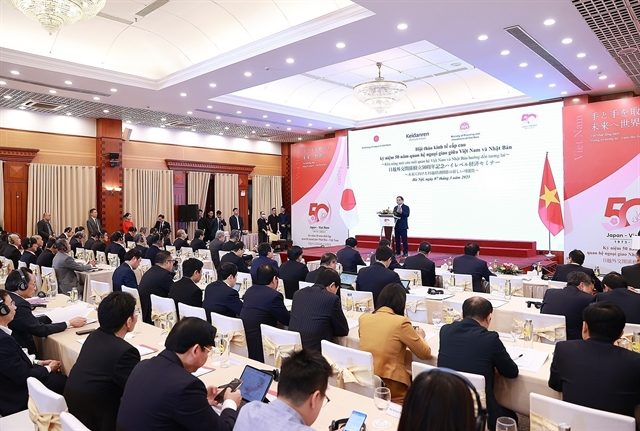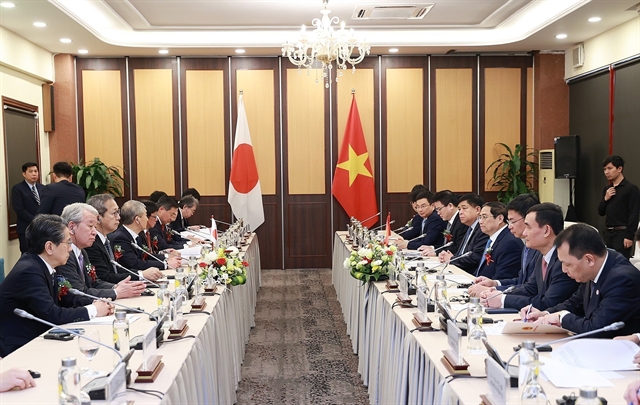The PM said over the course of 50 years, Japan had positioned itself as Viet Nam's largest donor of Official Development Assistance, disbursing nearly 3 trillion yen (US$22 billion).

As an old saying goes, 'good land attracts birds' and Viet Nam has become such a 'good land' for investors that over 60 per cent of Japanese firms want to do business in the country, according to Prime Minister Pham Minh Chinh.
PM Chinh made the remarks at a high-level economic seminar on Tuesday on the 50th anniversary of Viet Nam-Japan diplomatic relations.
The PM said over the course of 50 years, Japan had positioned itself as Viet Nam's largest donor of Official Development Assistance, disbursing nearly 3 trillion yen (US$22 billion). Of which, 2.7 trillion comes as loans, 100 billion as aid, and 180 billion as financial support to cement technological cooperation.
The assistance has proved to be highly effective in fostering large-scale projects in the country, giving a big push to economic growth. More Japanese assistance has been called in to help Vietnamese strategic infrastructure maintain its momentum.
Regarding investment, Japan is the third-largest investor in Viet Nam, with over 5,000 active projects to date, amounting to an aggregate capital of nearly $70 billion. On the other hand, Vietnamese enterprises have initiated 104 projects in Japan with a total capital of approximately $20 million.
Commerce is the next sector in high gear. Accumulated bilateral trade hit about $50 billion by late 2022, with Japan being Viet Nam's fourth-largest trade partner. More importantly, the trade pattern is balanced as Viet Nam exports around $25 billion to and imports $24 billion from Japan.

The PM also highlighted the role of the Viet Nam-Japan Joint Initiative (VJJI) in improving Viet Nam's investment climate and consolidating its competitive advantages over other countries in the region.
He called on Japanese enterprises to push ahead with education and training, technology transfer, and knowledge-sharing to help Viet Nam lie squarely at the centre of the global supply chains.
"Vietnamese Government always looks on Japanese investors with favour and will do everything necessary to help them settle profitably in the country", said Chinh.
"The two economies are mutually supplementary and still have ample room for cooperation, especially in digital transition, supply chain diversification, and green growth," the PM said.
Ichikawa Hideo, co-chairman of the Vietnam-Japan Economic Committee, metaphorically described Viet Nam as a gateway of Asia to the world because of its geographical position and population of nearly 100 million.
For Japanese enterprises, Viet Nam had become a magnet for investment. Over 2,000 Japanese investors had an operational presence in the country with an aggregate accumulated investment of more than $65 billion.
The chairman also mentioned VJJI, which came into existence in 2003. He said the 20-year-old initiative had born fruit by helping Viet Nam move ahead with its institutional reform and infrastructure development.
"The initiative has already had a positive impact on the Vietnamese investment environment, facilitating foreign capital flows into the country", said Hideo.
He also asserted that his committee would spare no effort to take a more active role in the initiative to bring the bilateral relations to a new height.
Nguyen Chi Dung, Minister of Planning and Investment, opined that VJJI was a dialogue channel instrumental in improving the Vietnamese investment environment.
He called on Japanese enterprises to assist Viet Nam in its path toward digital transition and circular economy, which are a prerequisite for its goal of becoming an upper-middle income country by 2030.
He also suggested a programme to strengthen the ties between Vietnamese small- and medium-sized enterprises (SMEs) and Japanese counterparts in several fields, including digital transition and component industry.
"Vietnamese SMEs have the labour whereas Japanese ones have technologies and know-how. They are mutually supplementary", said Dung. — VNS





